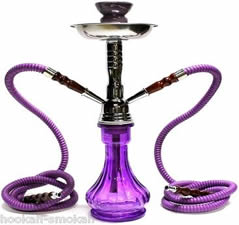 |
| Shisha Pipe |
In spite of the negative health effects of shisha smoking, its use has become increasingly popular among young people and adults of both genders across Africa. Shisha smoking has traditionally been associated with the Eastern Mediterranean region, Southeast Asia. The use of Shisha accounts for a significant and growing share of tobacco use globally. It has surpassed cigarette use in some Countries, with growing use by both men and women and, most seriously, among young people and children.
Despite the remarkable success of public health policies in reducing cigarette smoking in many countries, shisha smoking has thrived in the wake of strict tobacco control policies and regulations that are mostly cigarette-oriented. For example, shisha venues and products in many developed countries are exempt from tobacco control policies, and lack of enforcement of relevant tobacco control policies is the main problem in developing countries. This has contributed to the proliferation of shisha venues all over the world. In spite of the increase in knowledge, there is still a prevailing public misconception that shisha tobacco smoking is somehow protective or “safer” than cigarette smoking. In some countries, most especially Liberia, the prevalence of shisha tobacco smoking has increased in certain subgroups to exceed that of cigarette smoking.
Although nationally representative data on shisha use by adults are not widely available, the Global Adult Tobacco Survey showed that shisha smoking may be emerging in countries in which this tobacco product was not used previously. Research on shisha use in Africa is limited. For instance, a study conducted in South Africa among students revealed that 60% of high-school students in a poor urban community in Johannesburg reported ever having used a shisha, while 20% reported daily use.
In a study conducted by researchers at the University of Nairobi titled “Traces of Opiates in Shisha Collected in Nairobi, Kenya” notes that the occurrence of traces of narcotic drugs in the increasingly popular shisha is a great cause for concern. The study notes that since smoking is often social, and two or more people may share the same water-pipe, it exposes its users to infectious diseases such as TB and hepatitis. “Contrary to popular belief, the smoke that emerges from a water-pipe contains numerous toxicants known to cause diseases such as lung cancer, heart disease, and respiratory disease,” the UN agency notes in its latest advisory note on waterpipe tobacco smoking.
The World Health Organisation recently revealed that smoking shisha poses grave health risks as the smoke of 100 or more cigarettes is inhaled in a single session. “Cigarette smokers typically take eight to 12 cigarettes with 40 to 75-millimeter puffs and inhale 0.5 to 0.6 liters of smoke. [This is] unlike shisha-smoking sessions which typically last 20 to 80 minutes, during which the smoker may take 50 to 200 puffs which range from about 0.15 to 1 liter each." WHO also notes that water-pipe smokers and second-hand smokers are exposed to the same health risks associated with cigarette smoking.
Given these trends, more effort is needed to bring policy on waterpipe tobacco smoking. For instance, the East African Countries most especially Rwanda, Tanzania, and Kenya have taken drastic actions on the use of waterpipe tobacco smoking. They have banned the use of shisha in their respective nation. If the Government of Liberia has to Protect, Prevent and Preserved the Health of the Public, she has to act now. The Executive Law of 1972 Chapter 30, Section 2(a) and Section 2( e), gives full authority to the Ministry of Health to prevent the introduction and spread of communicable, infectious, and preventable diseases within the Republic of Liberia, as well as to prevent and abate conditions hazardous to Public health. According to a research by British Heart Association, it was found that the young generation is heavily getting dependent on the Shisha ignorant of the health hazards it causes, therefore, the Firm action is necessary by the Liberian Government to protect public health.
Conclusion
There is an urgent need to educate the public about the dangers of Shisha use. Our medical practitioners, religious leaders as well as non-governmental organizations should come forward and educate the public against the Shisha epidemic which is rapidly spreading in not only urban areas but also rural areas.
Recommendation
The Government should implement both tax and price measures on waterpipe tobacco and waterpipe products hence, discouraging the use of Shisha and ensuring that most, if not all of the general public, can live a safe and healthy life.
The Government should ensure that waterpipe tobacco, product packaging and waterpipes themselves should be labeled with health warnings.
It is not only the government's responsibility to discourage Shisha smoking but also the youth. Campaigns in universities should be held in order to increase awareness of the drug's hazards.
Given the prevalence of misinformation surrounding the health dangers of waterpipe tobacco smoking, specific education and training must be included in wider tobacco education and public awareness programmes.
About The Author: Melvin B. Moore is a Liberian, a researcher and a Master of Public Health student at the Department of Biostatistics & Epidemiology at Mount Kenya University, Nairobi Kenya. You can reach him on the following numbers: +254789355173, +254799869764 or via email: mooremelvinb@gmail.com
